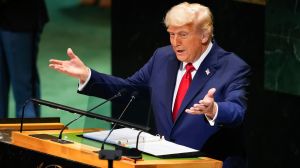Centre tells industrialists not to fear terrorism
The Centre has sought to shrug off nervousness of industralists linked to the rising terror attacks.

With terror strikes in the country’s commercial hubs creating fear among industrialists, the Centre on Monday sought to shrug off their nervousness, saying such attacks would not affect their economic prospects.
The assurance came from Union Minister of State for Home Sriprakash Jaiswal in the backdrop of recent terrorist attacks in Ahmedabad, Bangalore and Hyderabad.
Participating in a discussion here on national and regional security at the India Economic Summit 2008, organized by the World Economic Forum (WEF) and industry body CII, he said the terror attacks would not affect the country’s economy.
“These blasts will not hamper the country’s economy,” Jaiswal said.
Referring to the Naxal issue, the minister said the Centre has drawn up elaborate plans to deal with the menace. The naxal problem is the single biggest threat to the country’s internal security and industrialists are often scared to set up their plants in the affected areas.
Rejecting a view that India has failed to tackle terror, Deputy National Security Adviser Shekhar Dutt said security issues were uppermost in the minds of state and central authorities.
The approach has to be negotiation and dialogue, he said and suggested better sharing of information and communication between the Centre and the states.
Dutt said the country has a long and porous border and favoured national identity cards for all citizens to help security forces in identifying people.
Dutt said circulation of counterfeit notes was being monitored closely as it had links with terrorism.
Responding to a question whether there were loopholes in existing laws that resulted in low rate of conviction, he said a lot of evidence was needed before someone was convicted.
On how MNS leader Raj Thackeray was granted bail despite a number of cases against him, he said action was taken on the basis of Indian Penal Code provisions.
He, however, said that there was no unwillingness on the part of states to cooperate and added that despite the country’s federal structure, the Maharashtra Anti-Terrorism Squad has been going to other states to collect evidence on the Malegaon blast case.
Going into the root cause of terrorism in the country, he said a holistic approach was needed to remove unemployment of youth, provide them better opportunities for education and healthcare and improve infrastructure.
Dutt said increase in the activities of the manufacturing sector would address the problem of unemployment to a great extent.
During the discussion, speakers expressed concern over some recent terror strikes in the country and felt unrest was spreading from the northeast and Kashmir to commercial hubs.
They also referred to instability in Pakistan, Sri Lanka and Afghanistan, particularly on how it could affect India.
Ajai Chowdhry, CEO of HCL Infosystems, India, said the right kind of technology was needed to fight terrorism.
William S Cohen, former US Defence Secretary said the 9/11 incident had taught lessons on terrorism, but added that more was needed to be done.
Photos



- 01
- 02
- 03
- 04
- 05




























